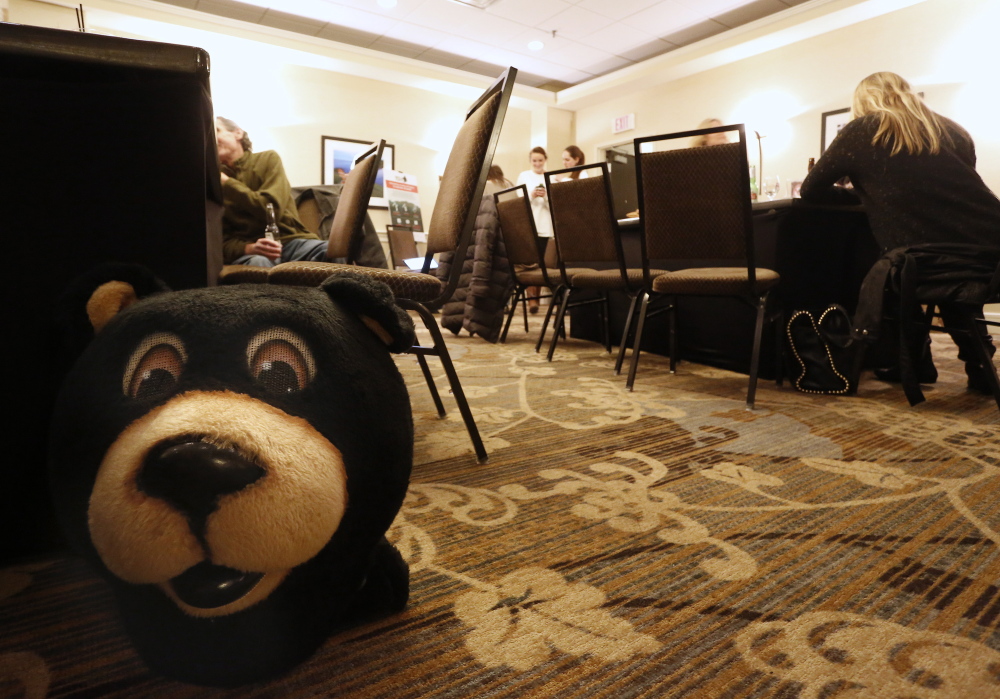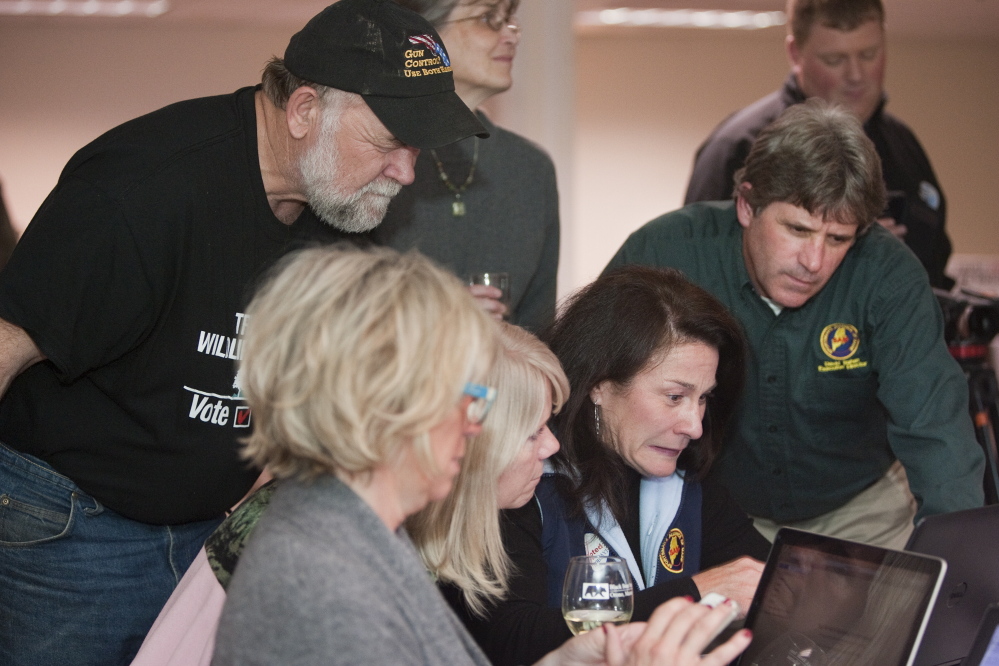Voters across the state went to the polls Tuesday to settle an emotional and long-running battle over bear-hunting practices in Maine. The outcome was uncertain at press time.
Question 1 asked Maine voters: “Do you want to ban the use of bait, dogs or traps in bear hunting except to protect property, public safety or for research?” Maine is the only state to allow all three bear-hunting practices.
With 51 percent of Maine precincts reporting late Tuesday, the “yes” votes in favor of Question 1 were trailing by a margin of 51.9 percent to 48.1 percent.
The ballot question marked the second time in 10 years that Mainers were asked to vote on the proposed ban. In 2004, voters rejected a similar referendum by a margin of 53-47 percent.
This year’s bear referendum has been more than an ethical debate between animal-welfare advocates and those who support hunting traditions. The campaign has been marked by different fund-raising approaches, out-of-state interests, high-profile spokespeople, vocal state biologists and a contentious lawsuit.
Supporters of the referendum say stalking black bears without the use of bait, traps and dogs is enough to control numbers without these methods, which they call inhumane.
Opponents, who include Maine state biologists, point to growing bear populations in states where hunting with bait is illegal, such as in Massachusetts. They say that without current hunting methods, the black bear population in Maine will swell and bears will threaten public safety.
According to the Maine Department of Inland Fisheries and Wildlife, the state’s black bear population, the largest in the eastern United States, has increased from 23,000 to more than 30,000 in the past 10 years.
Mainers who went to the polls Tuesday were passionate about the referendum.
Kaila Ripley, a 24-year-old trapper from Oakland, voted no because she said the animal-advocacy groups that put Question 1 on the ballot won’t be satisfied until all hunting and trapping is outlawed in every state. “This is only the beginning,” she said.
Meanwhile, Gayle Warren, a 69-year-old hunter from Gardiner, described the early morning breakfasts before family hunting trips as some of her favorite times. But she said she voted “yes” on 1.
“I don’t believe in baiting,” she said.
At the two campaign headquarters, reactions were mixed.
At the Black Bear Inn, No on 1 Campaign Manager James Cote said he was cautiously optimistic late Tuesday evening.
At the Yes on 1 campaign gathering at the Embassy Suites in Portland, Campaign Director Katie Hansberry took a moment to thank supporters, and voiced optimism.
“We are focused on the vote right now,” Hansberry said.
The most striking difference between the two campaign sides this time around compared with 2004 is the source of their campaign funds.
In 2004, proponents raised $1 million and opponents collected $1.6 million.
This year, Mainers for Fair Bear Hunting, the referendum proponents, raised more than $2 million in campaign funds, with just 3 percent – $59,717 – coming from Maine donors, according to the Maine Commission on Governmental Ethics and Election Practices.
The proponents of the ban received 97 percent of their donations from the Humane Society of the United States, based in Washington, D.C., leading opponents to view Maine as a political battleground over hunting traditions.
The coalition of groups opposing the referendum raised $2.8 million, with 39 percent of the money coming from Maine and 61 percent from at least 41 other states, according to campaign finance records.
Opponents of the referendum said the ballot measure was based on an anti-hunting agenda pushed by the Humane Society. This time, unlike 2004, the proponents were represented by the CEO and president of the Humane Society, Wayne Pacelle.
“It is important that we send (the Humane Society ) a strong message that their anti-hunting agenda will not go unchallenged here or anywhere else in the country,” Cote said.
Inland Fisheries and Wildlife has actively campaigned against the referendum. It is legal for state employees to speak out on ballot issues, according to the Maine Attorney General’s Office. But IFW employees were noticeably more outspoken leading up to the election than they were 10 years ago.
In 2004, commercials showed state biologists in plain clothes in residential areas speaking about black bear management.
This time, videos on the department website and TV commercials show Maine bear biologists in uniform, working with their equipment in the field and standing side-by-side with Maine game wardens as a large, unified group of state employees visibly standing in opposition to the ballot measure. In both cases the commercials were paid for by the group formed in 2004 to fight the referendum, the Maine Wildlife Conservation Council.
That approach that led to a court challenge when Mainers For Fair Bear Hunting filed a lawsuit on Sept. 30 in Cumberland County Superior Court accusing IFW of illegally using public funds to campaign against the referendum. The group also filed for an injunction forbidding the department from continuing to use state funds on the campaign and a Freedom of Information Act request for department emails.
But Cumberland County Superior Court Justice Joyce Wheeler ruled that Mainers For Fair Bear Hunting failed to demonstrate that the department’s opposition to Question 1 caused “irreparable injury,” and that department employees’ free speech is protected under the First Amendment.
In the fiscal year that began July 1, IFW received 7 percent of its funding from the state’s General Fund. Fifty-six percent of the department’s $38 million annual budget came from hunting and fishing licenses and outdoor sporting fees, while the rest came from the federal government (25 percent) and special revenue such as conservation license plates (12 percent).
Staff writers Tom Bell and J. Craig Anderson contributed to this report.
Send questions/comments to the editors.







Success. Please wait for the page to reload. If the page does not reload within 5 seconds, please refresh the page.
Enter your email and password to access comments.
Hi, to comment on stories you must . This profile is in addition to your subscription and website login.
Already have a commenting profile? .
Invalid username/password.
Please check your email to confirm and complete your registration.
Only subscribers are eligible to post comments. Please subscribe or login first for digital access. Here’s why.
Use the form below to reset your password. When you've submitted your account email, we will send an email with a reset code.